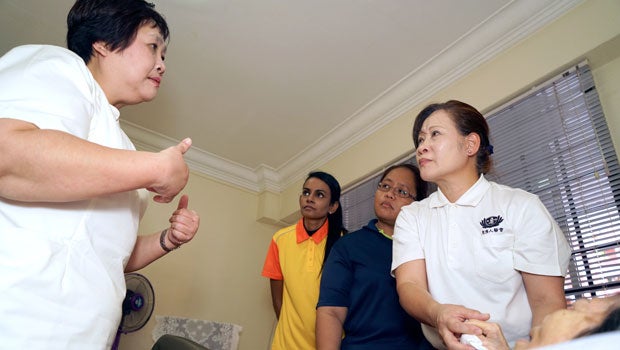HealthXchange will NEVER ask you to transfer money over a call. If in doubt, call the 24/7 ScamShield helpline at 1799, or visit the ScamShield website at www.scamshield.gov.sg.

The NNI Parkinson Home Care Training and Support Programme helps patients with Parkinson’s Disease receive coordinated community care in their own homes.
Parkinson’s Disease (PD) is the second most common neurodegenerative disease in Singapore, affecting three in every 1,000 people aged 50 and above. With the nation’s ageing population, the number of patients with PD is growing. Patients require long-term treatment but their movements are often limited with this debilitating condition.
Ms Yvonne Chew, an NNI Senior Staff Nurse who conducts home visits, shared, “Advanced PD patients are largely hindered by their mobility problem. Getting out of the home for their follow-up appointments poses a great challenge to both the patient and caregivers.”
To better support patients with PD and related conditions, the National Neuroscience Institute (NNI) has introduced the NNI Parkinson Home Care Training and Support Programme. The programme trains community home care nurses to champion care for their patients who suffer from PD. To ensure seamless care, the home care nurses work closely with hospital-based nurses.

Watch the video to find out how the NNI Parkinson Home Care Training and Support Programme benefit patients and caregivers
Says Associate Professor Louis Tan, Senior Consultant at NNI’s Department of Neurology and Director of the Programme, “Many of our patients are frail and elderly and many are home alone or with a domestic helper in the day. This programme enables us to assess how these patients are coping at home, pre-empt complications, and bring to them the available community resources to support them.”
Since the programme started in July 2015, 46 home care nurses have undergone clinical attachments at NNI. 53 home care visit attachments have been conducted with the community home care nurses, and home visits were carried out for 51 PD patients. NNI targets to serve more than 100 patients under this Programme.
Ms Chew said, “Being able to receive timely encouragement and care at their doorstep from a nurse’s visit means a lot to these home-bound patients.”
The Programme is supported by the TOTE Board Community Healthcare Fund.
Get the Health Buddy App
© 2025 SingHealth Group. All Rights Reserved.













 Get it on Google Play
Get it on Google Play